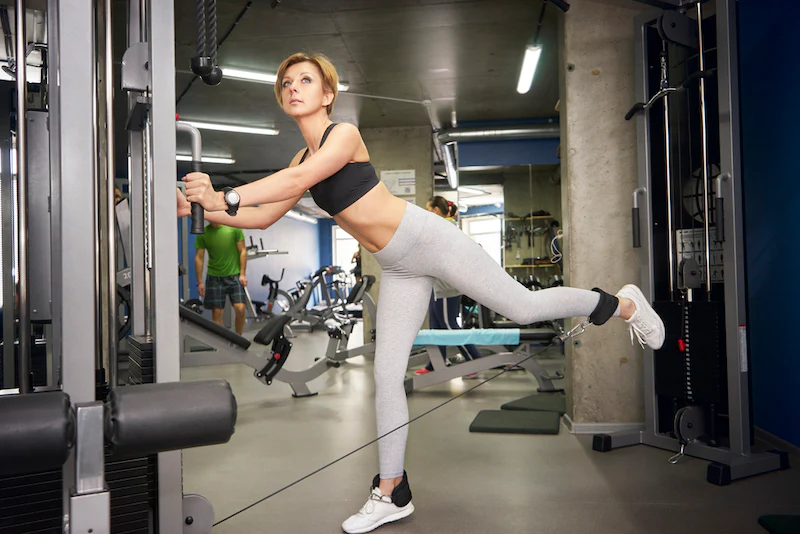Can you really lose fat and gain muscle at the same time? Body recomposition is all about that! It’s a clever fitness strategy that might just change the way you think about getting in shape. Imagine transforming your body without obsessing over the scale. Sounds intriguing, right? Let’s find out how this approach works and if it’s something you can achieve.

Contents
- 1 What Is Body Recomposition?
- 2 Benefits of Body Recomposition
- 3 How to Achieve Body Recomposition?
- 4 How Does Body Recomposition Work?
- 5 Frequently Asked Questions
- 5.1 How does nutrition factor into body recomposition?
- 5.2 What is the general timeline for body recomposition to take effect?
- 5.3 How many meals per day are recommended during body recomposition?
- 5.4 How many times per week should I work out for effective body recomposition?
- 5.5 What amount of protein should I consume for successful body recomposition?
What Is Body Recomposition?
Body recomposition is a fitness approach that aims to change your body composition by simultaneously losing fat and gaining muscle. It’s different from traditional weight loss goals that focus solely on the number on the scale.
Here’s a breakdown of what body recomposition involves:
- Focus on Composition, Not Weight: While some weight loss might occur, the primary goal is to increase your muscle mass percentage relative to fat mass. This can lead to a more sculpted and toned physique.
- Diet and Exercise: It requires a balanced diet with sufficient protein to support muscle growth, alongside a calorie intake that creates a slight calorie deficit for fat loss. Strength training is crucial to stimulate muscle building.
- Long-Term Approach: Body recomposition is a gradual process that takes time and dedication. It’s not about quick fixes but rather sustainable lifestyle changes.
Benefits of Body Recomposition
Body recomposition offers a range of advantages that go beyond just aesthetics. Here are some of the key benefits:

Improved Body Composition: This is the core perk, where you lose fat while simultaneously building muscle. This leads to a more sculpted and toned physique.
Enhanced Metabolism: Muscle burns more calories than fat, even at rest. By increasing muscle mass, you boost your metabolism, helping you burn more calories throughout the day.
Reduced Disease Risk: Excess body fat is linked to various chronic diseases like type 2 diabetes and heart disease. Body recomposition can help lower your risk of these conditions.
Stronger and More Functional: As you gain muscle, your overall strength increases. This improves your ability to perform daily activities and reduces your risk of injuries.
Mental Well-being: Building a strong and toned physique can significantly boost your confidence and self-esteem. The discipline required for recomposition can also be empowering.
Sustainable Approach: Unlike crash diets or extreme bulking phases, body recomposition focuses on gradual, sustainable changes that you can maintain for the long term.
Overall, body recomposition is a healthy and sustainable approach to achieving a fit and toned physique.
How to Achieve Body Recomposition?
Achieving body recomposition, where you simultaneously lose fat and gain muscle, is a nuanced process that requires a multifaceted approach. Here’s how you can embark on this journey:

-
High-Protein Diet: Prioritize a diet rich in protein, aiming for 2.6 to 3.5 grams of protein per kilogram of bodyweight. This supports muscle synthesis and recovery. Incorporate balanced meals that include proteins, carbs, fats, and fiber—think chicken breast with whole-grain rice and broccoli or salmon with potatoes and asparagus.
-
Caloric Intake: Aim for roughly maintenance calories. Adjust your intake slightly to promote fat loss or muscle gain as needed, but drastic caloric deficits or surpluses can undermine your efforts. Listening to your appetite and making adjustments based on your body’s response is key.
-
Strength Training and Cardio: Engage in weight lifting two to six times per week, focusing on progressive overload to continually challenge your muscles. Adding some cardio or interval training can help with fat loss and cardiovascular health.
-
Sleep and Recovery: Prioritize sleep, aiming for 7 to 9 hours per night. Good sleep supports hormonal balance, muscle recovery, and overall health, all crucial for effective body recomposition.

-
Patience and Consistency: Body recomposition is a slow process, especially if you’re not a beginner to physical training. It requires patience, consistency in your diet and exercise routines, and a focus on incremental progress.
-
Healthy Lifestyle Choices: Incorporate healthy fats, avoid processed saturated fats, and opt for foods rich in polyunsaturated fats like nuts. Improve your bedtime routine for better sleep quality, as this will directly impact your ability to lose fat and gain muscle.
How Does Body Recomposition Work?
Body recomposition, or “recomp,” is all about tweaking your body dynamics. You’re essentially losing excess fat while packing on more muscle. Sounds like a win-win, doesn’t it?

For this process to work, it’s not really about “who” it works best for but “when”. Let’s give you the skinny on that.
Newbies to Weight Training: Oh, if you’re fresh off the starting blocks on your fitness journey, you’re in luck! Your body is ripe and ready for body recomposition. Your muscles are about to get a shock of their life with weight training and diet changes. Before you know it, you’ll see quick improvements.
Returning Athletes: Then there are those who’ve had a time-off. Maybe some injury benched you or life got in the way. Regardless, your muscles remember their glory days. Getting back in the game, you’ll find gaining back muscle and shedding fat is a cinch.
Those with Higher Body Fat: Carrying some extra weight around? Body recomposition is the perfect starting point for you. While your muscles get stronger and bigger, your body can use that sluggish fat as extra fuel.
Dedicated Lifters: For the lifting veterans out there. Yeah, you heard it right. With a well-disciplined and dedicated routine, expect some prized body recomp benefits. But, remember it’s all about strict consistency.
Who might struggle?:
If you’re a seasoned lifter who is already on the lean side, brace yourself for a tougher task. Why? It’s simple. Your body doesn’t appreciate change at this point. Simultaneous muscle gain and fat loss is a high order. The same goes for the more casual gym-goers out there.
Frequently Asked Questions
How does nutrition factor into body recomposition?
Proteins are integral to the process of body recomposition as they supply the body with amino acids needed for muscle repair and growth. High-quality protein sources include lean meats, poultry, fish, eggs, and dairy products.
What is the general timeline for body recomposition to take effect?
You can expect visible changes from body recomposition after maintaining a high-protein diet and consistent strength training routine for 8-12 weeks.
How many meals per day are recommended during body recomposition?
Aiming for at least three evenly spread meals a day is a good practice. More carbs should be included in your pre-workout and post-workout meals, while protein and fat intake should be fairly constant at each meal.
How many times per week should I work out for effective body recomposition?
Experts suggest engaging in 45-minute strength and weight-training workouts three to four days a week, with 60-second rests between exercises. Including High-Intensity Interval Training (HIIT) workouts can also enhance fat loss and muscle gain.
What amount of protein should I consume for successful body recomposition?
Using the 30% Protein Rule is a good strategy for body recomposition. This means that approximately 30% of your calorie intake should come from proteins to effectively lose fat and gain muscle.

Hello, I’m Ravindra. Over the years, I’ve immersed myself deeply into the world of fitness and health, transforming both my body and mind. Writing has allowed me to share my journey, insights, and expertise with those just starting out and seasoned fitness enthusiasts alike. Beyond just routines and diets, I believe in inspiring others to adopt a holistic approach to well-being.
